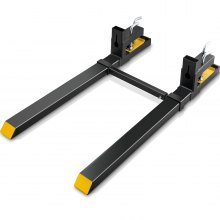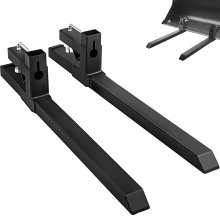
























Discover the unparalleled blend of affordability and quality with VEVOR's forklift forks, designed to redefine efficiency and resilience in material handling. Tailored to meet the rigorous demands of diverse industries, our forklift forks are engineered from premium-grade steel, ensuring maximum durability and reliability. With an emphasis on precision, each pair of forks boasts an exceptional load-bearing capacity, facilitating smooth and safe transportation of goods. The easy-to-install design not only enhances compatibility across various forklift models but also significantly reduces downtime, thereby boosting productivity. Moreover, the ergonomic structure promises an optimized handling experience, minimizing strain and maximizing efficiency. Perfect for warehouse operations, manufacturing plants, and construction sites, VEVOR's forklift forks are your go-to solution for optimizing operational performance and safety. Embrace the power of quality and affordability; choose VEVOR forklift forks today and elevate your material handling capabilities to new heights.
Forklift forks, also known as tines or blades, are fundamental components of forklifts used in material handling operations across various industries. These sturdy, metal structures serve as the primary means of lifting and transporting loads, providing stability and support during lifting and maneuvering tasks.
Forklift forks play a pivotal role in facilitating the movement of goods within warehouses, distribution centers, manufacturing facilities, and construction sites. By securely engaging with pallets, crates, and other load-bearing structures, these forks enable forklift operators to efficiently transport materials from one location to another, contributing to increased productivity and streamlined operations.
Forklift forks are typically constructed from high-strength steel or alloy materials to withstand heavy loads and endure the rigors of daily use. They feature a tapered shape with a flat, horizontal surface, allowing them to slide underneath pallets and other materials for secure lifting and positioning. Additionally, fork tips may be reinforced or equipped with wear-resistant coatings to enhance durability and longevity.
Forklift forks are available in various types and configurations to accommodate different load sizes, shapes, and weight capacities. Understanding the characteristics of each fork type is essential for selecting the most suitable option for specific material handling requirements.
Standard forklift forks are the most common type, featuring a straight design with evenly spaced tines. These forks are versatile and can handle a wide range of pallet sizes and load weights, making them ideal for general-purpose material handling tasks in warehouses and distribution centers.
Telescopic forklift forks, also known as adjustable forks, feature extendable tines that can be adjusted to accommodate various load sizes. These forks provide greater flexibility and versatility, allowing operators to handle oversized or irregularly shaped loads with ease. Telescopic forks are particularly useful in industries where handling diverse load types is common, such as logistics, manufacturing, and construction.
In addition to standard and telescopic forks, a variety of specialized fork attachments are available to enhance the capabilities of forklifts for specific material handling tasks. Examples include side shifters for lateral load positioning, fork positioners for automatic fork adjustment, and fork extensions for handling longer loads. These attachments enable forklift operators to optimize efficiency and productivity while minimizing the need for manual handling and repositioning of loads.
Proper maintenance and safety practices are essential for ensuring the reliable performance and longevity of forklift forks while minimizing the risk of accidents and injuries in the workplace.
Regular inspection and maintenance of forklift forks are critical for identifying signs of wear, damage, or misalignment that could compromise safety and performance. Inspect forks for cracks, bends, or excessive wear on the tines, shafts, and mounting hardware. Additionally, lubricate moving parts, such as pivot points and adjusting mechanisms, to ensure smooth operation and prevent premature wear.
Understanding the load capacity and stability limits of forklift forks is essential for safe and efficient material handling operations. Never exceed the rated capacity of the forks or attempt to lift loads that are unstable or improperly positioned. Ensure that loads are centered on the forks and fully supported to prevent tipping or loss of control during lifting and transportation.
Proper training and certification of forklift operators are paramount for promoting safe handling practices and minimizing the risk of accidents in the workplace. Operators should be trained in the proper operation of forklifts, including load handling techniques, maneuvering in confined spaces, and recognizing potential hazards. Additionally, maintaining clear visibility and awareness of surroundings while operating forklifts can help prevent collisions and injuries.
Forklift forks are essential components of forklifts that play a central role in material handling operations across various industries. By understanding the different types of forks available, implementing proper maintenance and safety practices, and providing comprehensive operator training, businesses can optimize efficiency, productivity, and safety in their material handling operations. Investing in high-quality forklift forks from reputable manufacturers ensures reliable performance and long-term value, contributing to the success and competitiveness of modern industrial operations.
Forklift forks, also known as tines or blades, are the load-bearing components of a forklift used for lifting and transporting heavy loads. They are typically attached to the carriage of the forklift and come in various lengths, widths, and capacities to accommodate different types of loads and applications.
Choosing the right forklift forks depends on several factors, including the weight and size of the loads you typically handle, the width of the loads, and the compatibility with your forklift's carriage. It's essential to select forks with a length that allows for proper load stability and clearance, as well as ensuring that the forks have a sufficient weight capacity to handle your heaviest loads safely.
There are several types of forklift forks available to suit various applications and industries. Standard forks are the most common type and are suitable for general lifting and handling tasks. Specialized forks, such as tapered forks, carpet poles, or rotating forks, are designed for specific applications like handling irregularly shaped loads or palletless materials. Additionally, forks with attachments such as side shifters or fork positioners can enhance the versatility and efficiency of your forklift.
To maintain optimal performance and safety, it's essential to inspect forklift forks regularly for signs of wear, damage, or deformation. Check for cracks, bends, or excessive wear on the fork blades, and ensure that the fork tips are not excessively worn or damaged. Keep the forks clean and free of debris, and lubricate the fork attachment points as needed to prevent corrosion and ensure smooth operation. If you notice any issues during inspection, replace the forks immediately to avoid potential accidents or damage to your forklift and loads.
Yes, forklift forks can be customized or modified to suit specific applications or unique requirements. Customization options may include altering the length, width, or thickness of the forks, adding reinforcements for handling heavier loads, or incorporating special features such as fork extensions or rollers for handling specific types of materials. Consulting with a forklift equipment supplier or manufacturer can help you determine the best customization options for your needs and ensure that your forklift forks are tailored to your specific application.